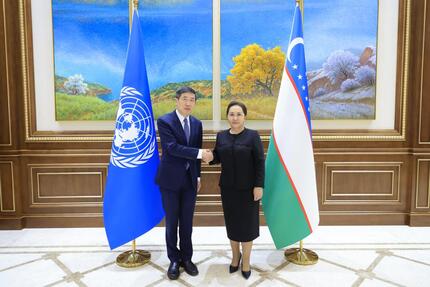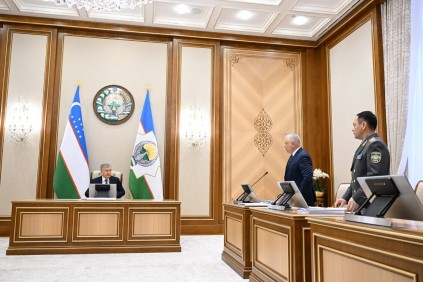The United Nations Development Programme Associate Administrator, Haoliang Xu, has wrapped his visit to Uzbekistan today.
During his visit, Mr. Xu restated UNDP's commitment to harnessing country's presence and policy expertise in support of inclusive, resilient, and sustainable development, and reaffirmed UNDP's long-standing partnership with the Government of Uzbekistan.
In a series of high-level meetings, Mr. Xu exchanged views with the Senate Chairperson as well as the Chairperson of the Board of the Council of Women Entrepreneurs. They discussed deeper collaboration on four priority areas:
- Job creation and poverty reduction, with an emphasis on green jobs, digital transformation with greater focus on human capital development on youth and women in remote context.
- Biodiversity conservation, climate resilience and green growth, including adaptation measures for vulnerable regions such as the Aral Sea basin;
- Gender equality, following Uzbekistan's recent milestone of a 40 percent parliamentary quota for women;
• Governance reform including accelerating anti-corruption initiatives, building on UNDP's technical support for strengthened integrity systems at national and local levels and support to capacity building of parliament in implementation of the oversight and legislative functions;
“UNDP has been a trusted partner to Uzbekistan for over three decades,” Mr. Xu said. “We recognize the strides the country has made —and we stand ready to accelerate reforms that tackle inequality, empower youth and women, and build resilience across all regions.”
Mr. Xu also visited with women entrepreneurs at a UNDP-support training project site witnessing firsthand how initiatives are implemented on the ground.
“This visit underscores our shared vision for a more inclusive, green, and resilient Uzbekistan,” he added.
Since 1993, UNDP has worked alongside the Government, civil society, and the private sector to fast-track Uzbekistan's progress toward the Sustainable Development Goals. Today, UNDP continues to enhance national and local capacities for effective governance, sustainable economic growth, and climate action—ensuring that no one is left behind.














